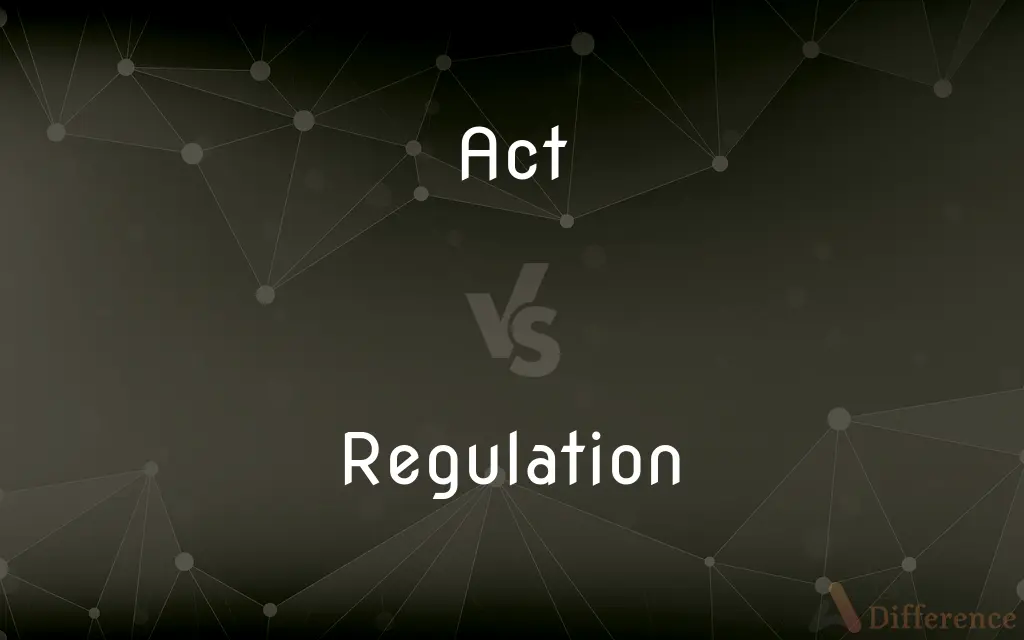Act vs. Regulation — What's the Difference?
By Tayyaba Rehman & Urooj Arif — Updated on March 12, 2024
An Act is formal legislation passed by a governing body, while a regulation is a rule set by an authority to enforce Acts.

Difference Between Act and Regulation
Table of Contents
ADVERTISEMENT
Key Differences
An Act is a statutory law enacted by a legislative body through a formal process that involves proposal, debate, and voting. It is a primary legislation that sets out broad principles and frameworks. Whereas, a regulation, often considered secondary legislation, is created by an executive authority under the powers granted by an Act, and details specific guidelines, rules, or standards necessary for its implementation.
Acts are more general and broad in scope, laying down the legal foundation for various aspects of governance, society, and individual behavior. Regulations, on the other hand, are more specific and detailed, providing the necessary instructions for compliance with the Acts, thereby ensuring their effective application.
The creation of an Act involves a formal legislative process, which includes drafting, discussion, amendments, and approval by the elected representatives, and finally, it becomes law upon receiving the assent of the head of state. Regulations, however, are usually developed by government agencies or departments within the scope of authority granted by an Act, and do not typically require the legislative process that Acts undergo.
Acts serve as the source of authority for regulations. Without an Act, regulations would lack legal backing. Regulations operationalize and enforce the intentions of an Act by laying out the practical steps, conditions, and procedures for compliance, ensuring the Act's objectives are met in day-to-day applications.
While Acts are generally more difficult to amend, given their need to pass through the full legislative process again, regulations can be updated or revised more easily to respond to changing circumstances, new information, or practical challenges encountered in their enforcement or application.
ADVERTISEMENT
Comparison Chart
Nature
Primary legislation passed by a legislative body.
Secondary legislation set by an authority.
Purpose
Establishes broad legal principles and frameworks.
Provides detailed rules for implementing Acts.
Creation Process
Undergoes a formal legislative process.
Developed by authorities within an Act's framework.
Scope
General and broad.
Specific and detailed.
Flexibility
Harder to amend due to legislative process.
Easier to update or revise.
Compare with Definitions
Act
Legislative Law
The Civil Rights Act was a landmark piece of legislation ensuring equality.
Regulation
Detailed Rules
Environmental regulations set specific standards for pollution control.
Act
Formal Process
Passing an Act requires debates, amendments, and approval by lawmakers.
Regulation
Executive Creation
Regulations are often developed by government agencies within legal bounds.
Act
Source of Authority
Acts authorize the creation of regulations for detailed governance.
Regulation
Implementation Focus
Regulations detail the practical steps for Act compliance.
Act
Broad Framework
Acts provide the foundational legal structure for various sectors.
Regulation
Operationalizes Acts
Financial regulations ensure the banking Act's objectives are met.
Act
Difficult to Amend
Amending an Act requires another round through the legislative process.
Regulation
Easily Revised
Regulations can be quickly updated to address new challenges.
Act
The process of doing or performing something
The act of thinking.
Regulation
Regulation is the management of complex systems according to a set of rules and trends. In systems theory, these types of rules exist in various fields of biology and society, but the term has slightly different meanings according to context.
Act
Something done or performed; a deed
A charitable act.
Regulation
A rule or directive made and maintained by an authority
Planning regulations
Act
(Law) Something done that has legal significance
A criminal act.
Regulation
The action or process of regulating or being regulated
The regulation of financial markets
Act
A statute or other law formally adopted by a legislative body
An act of Congress.
Regulation
The act of regulating or the state of being regulated.
Act
A formal written record of proceedings or transactions.
Regulation
A principle, rule, or law designed to control or govern conduct.
Act
One of the major divisions of a play, opera, or film.
Regulation
A governmental order having the force of law. Also called executive order.
Act
A performance or entertainment usually forming part of a longer presentation
A juggling act.
A magic act.
Regulation
(Embryology) The capacity of an embryo to continue normal development following injury to or alteration of a structure.
Act
The actor or actors presenting such a performance
Joined the act in Phoenix.
Regulation
(Sports) The standard playing period for a timed game, prior to overtime or a shootout.
Act
A manifestation of intentional or unintentional insincerity; a pose
Put on an act.
Regulation
(uncountable) The act of regulating or the condition of being regulated.
Act
To play the part of; assume the dramatic role of
She plans to act Ophelia in summer stock.
Regulation
(countable) A law or administrative rule, issued by an organization, used to guide or prescribe the conduct of members of that organization.
Army regulations state a soldier AWOL over 30 days is a deserter.
Act
To perform (a role) on the stage
Act the part of the villain.
Regulation
A type of law made by the executive branch of government, usually by virtue of a statute made by the legislative branch giving the executive the authority to do so.
Act
To behave like or pose as; impersonate
Don't act the fool.
Regulation
A numbered provision within such kind of law.
Act
To behave in a manner suitable for
Act your age.
Regulation
(European Union law) A form of legislative act which is self-effecting, and requires no further intervention by the Member States to become law.
Act
To behave or comport oneself
She acts like a born leader.
Regulation
(genetics) Mechanism controlling DNA transcription.
Act
To perform in a dramatic role or roles.
Regulation
(medicine) Physiological process which consists in maintaining homoeostasis.
Act
To be suitable for theatrical performance
This scene acts well.
Regulation
In conformity with applicable rules and regulations.
Act
To behave affectedly or unnaturally; pretend.
Regulation
The act of regulating, or the state of being regulated.
The temper and regulation of our own minds.
Act
To appear or seem to be
The dog acted ferocious.
Regulation
A rule or order prescribed for management or government; prescription; a regulating principle; a governing direction; precept; law; as, the regulations of a society or a school.
Act
To carry out an action
We acted immediately. The governor has not yet acted on the bill.
Regulation
An authoritative rule
Act
To operate or function in a specific way
His mind acts quickly.
Regulation
A principle or condition that customarily governs behavior;
It was his rule to take a walk before breakfast
Short haircuts were the regulation
Act
To serve or function as a substitute for another
A coin can act as a screwdriver.
Regulation
The state of being controlled or governed
Act
To produce an effect
Waited five minutes for the anesthetic to act.
Regulation
(embryology) the ability of an early embryo to continue normal development after its structure has been somehow damaged or altered
Act
(countable) Something done, a deed.
An act of goodwill
Regulation
The act of bringing to uniformity; making regular
Act
Actuality.
Regulation
The act of controlling or directing according to rule;
Fiscal regulations are in the hands of politicians
Act
(theology) Something done once and for all, as distinguished from a work.
Regulation
Prescribed by or according to regulation;
Regulation army equipment
Act
A product of a legislative body, a statute.
Act
The process of doing something.
He was caught in the act of stealing.
Act
(countable) A formal or official record of something done.
Act
A division of a theatrical performance.
The pivotal moment in the play was in the first scene of the second act.
Act
(countable) A performer or performers in a show.
Which act did you prefer? The soloist or the band?
Act
(countable) Any organized activity.
Act
(countable) A display of behaviour.
Act
A thesis maintained in public, in some English universities, by a candidate for a degree, or to show the proficiency of a student.
Act
(countable) A display of behaviour meant to deceive.
To put on an act
Act
Senseid|en|act of parliament}} (law) {{ellipsis of act of parliament
Act
(intransitive) To do something.
If you don't act soon, you will be in trouble.
Act
To do (something); to perform.
Act
(intransitive) To perform a theatrical role.
I started acting at the age of eleven in my local theatre.
Act
(intransitive) Of a play: to be acted out (well or badly).
Act
(intransitive) To behave in a certain manner for an indefinite length of time.
A dog which acts aggressively is likely to bite.
I believe that Bill's stuck-up because of the way that he acts.
He's acting strangely - I think there's something wrong with him.
Act
(copulative) To convey an appearance of being.
He acted unconcerned so the others wouldn't worry.
Act
(intransitive) To do something that causes a change binding on the doer.
Act on behalf of John
Act
(transitive) To play (a role).
He's been acting Shakespearean leads since he was twelve.
Act
(transitive) To feign.
He acted the angry parent, but was secretly amused.
Act
To map via a homomorphism to a group of automorphisms (of).
This group acts on the circle, so it can't be left-orderable!
Act
To move to action; to actuate; to animate.
Act
To enact; to decree.
Act
That which is done or doing; the exercise of power, or the effect, of which power exerted is the cause; a performance; a deed.
That best portion of a good man's life,His little, nameless, unremembered actsOf kindness and of love.
Act
A state of reality or real existence as opposed to a possibility or possible existence.
The seeds of plants are not at first in act, but in possibility, what they afterward grow to be.
Act
Process of doing; action. In act, in the very doing; on the point of (doing).
This woman was taken . . . in the very act.
Act
To move to action; to actuate; to animate.
Self-love, the spring of motion, acts the soul.
Act
To perform; to execute; to do.
That we act our temporal affairs with a desire no greater than our necessity.
Industry doth beget by producing good habits, and facility of acting things expedient for us to do.
Uplifted hands that at convenient timesCould act extortion and the worst of crimes.
Act
To perform, as an actor; to represent dramatically on the stage.
Act
To assume the office or character of; to play; to personate; as, to act the hero.
Act
To feign or counterfeit; to simulate.
With acted fear the villain thus pursued.
Act
To exert power; to produce an effect; as, the stomach acts upon food.
Act
To perform actions; to fulfill functions; to put forth energy; to move, as opposed to remaining at rest; to carry into effect a determination of the will.
He hangs between, in doubt to act or rest.
Act
To behave or conduct, as in morals, private duties, or public offices; to bear or deport one's self; as, we know not why he has acted so.
Act
To perform on the stage; to represent a character.
To show the world how Garrick did not act.
Act
A legal document codifying the result of deliberations of a committee or society or legislative body
Act
Something that people do or cause to happen
Act
A subdivision of a play or opera or ballet
Act
A short theatrical performance that is part of a longer program;
He did his act three times every evening
She had a catchy little routine
It was one of the best numbers he ever did
Act
A manifestation of insincerity;
He put on quite an act for her benefit
Act
Perform an action, or work out or perform (an action);
Think before you act
We must move quickly
The governor should act on the new energy bill
The nanny acted quickly by grabbing the toddler and covering him with a wet towel
Act
Play a role or part;
Gielgud played Hamlet
She wants to act Lady Macbeth, but she is too young for the role
She played the servant to her husband's master
Act
Discharge one's duties;
She acts as the chair
In what capacity are you acting?
Act
Pretend to have certain qualities or state of mind;
He acted the idiot
She plays deaf when the news are bad
Act
Be suitable for theatrical performance;
This scene acts well
Act
Have an effect or outcome; often the one desired or expected;
The voting process doesn't work as well as people thought
How does your idea work in practice?
This method doesn't work
The breaks of my new car act quickly
The medicine works only if you take it with a lot of water
Act
Be engaged in an activity, often for no particular purpose other than pleasure
Act
Behave unnaturally or affectedly;
She's just acting
Act
Perform on a stage or theater;
She acts in this play
He acted in `Julius Caesar'
I played in `A Christmas Carol'
Common Curiosities
Who creates regulations?
Regulations are usually created by government agencies or executive authorities within the framework of an Act.
Are Acts and regulations the same in all countries?
The process and terminology for Acts and regulations can vary by country, but the general principles are similar worldwide.
How do individuals or businesses comply with Acts and regulations?
Compliance involves adhering to the principles set out in Acts and following the detailed requirements of regulations.
Can an Act exist without regulations?
While an Act can exist without regulations, regulations are essential for detailing how an Act will be implemented and enforced.
Can regulations override Acts?
No, regulations cannot override Acts; they must align with and operationalize the provisions of Acts.
Can the public contribute to the creation of Acts or regulations?
The public can often contribute through consultations, feedback, and participation in the legislative process for Acts and regulatory comment periods.
How are Acts and regulations enforced?
Enforcement mechanisms vary but often involve government agencies, inspections, fines, and legal proceedings.
Are regulations less important than Acts?
Regulations are not less important; they are essential for the detailed implementation and enforcement of Acts.
Can an individual challenge a regulation?
Yes, individuals can challenge regulations in court, especially if they believe the regulation exceeds the authority of the Act or violates legal rights.
What role do legislators play in creating regulations?
Legislators typically do not create regulations directly but empower agencies to do so through Acts.
What happens if a regulation contradicts an Act?
If a regulation contradicts an Act, it is generally considered invalid or unenforceable, as Acts take precedence.
How do Acts and regulations impact businesses?
Businesses must comply with both Acts and regulations, which can affect their operations, compliance costs, and legal responsibilities.
Can a regulation be revoked or changed?
Yes, regulations can be revoked, changed, or updated by the issuing authority to adapt to new circumstances or policy changes.
How do courts interpret Acts and regulations?
Courts interpret Acts and regulations based on their text, intent, and legal precedents, ensuring they align with constitutional principles.
Do regulations need to be published?
Yes, regulations are typically published to ensure transparency and to inform the public and stakeholders of their requirements.
Share Your Discovery

Previous Comparison
Hinduism vs. Jainism
Next Comparison
Monocotyledon vs. DicotyledonAuthor Spotlight
Written by
Tayyaba RehmanTayyaba Rehman is a distinguished writer, currently serving as a primary contributor to askdifference.com. As a researcher in semantics and etymology, Tayyaba's passion for the complexity of languages and their distinctions has found a perfect home on the platform. Tayyaba delves into the intricacies of language, distinguishing between commonly confused words and phrases, thereby providing clarity for readers worldwide.
Co-written by
Urooj ArifUrooj is a skilled content writer at Ask Difference, known for her exceptional ability to simplify complex topics into engaging and informative content. With a passion for research and a flair for clear, concise writing, she consistently delivers articles that resonate with our diverse audience.














































